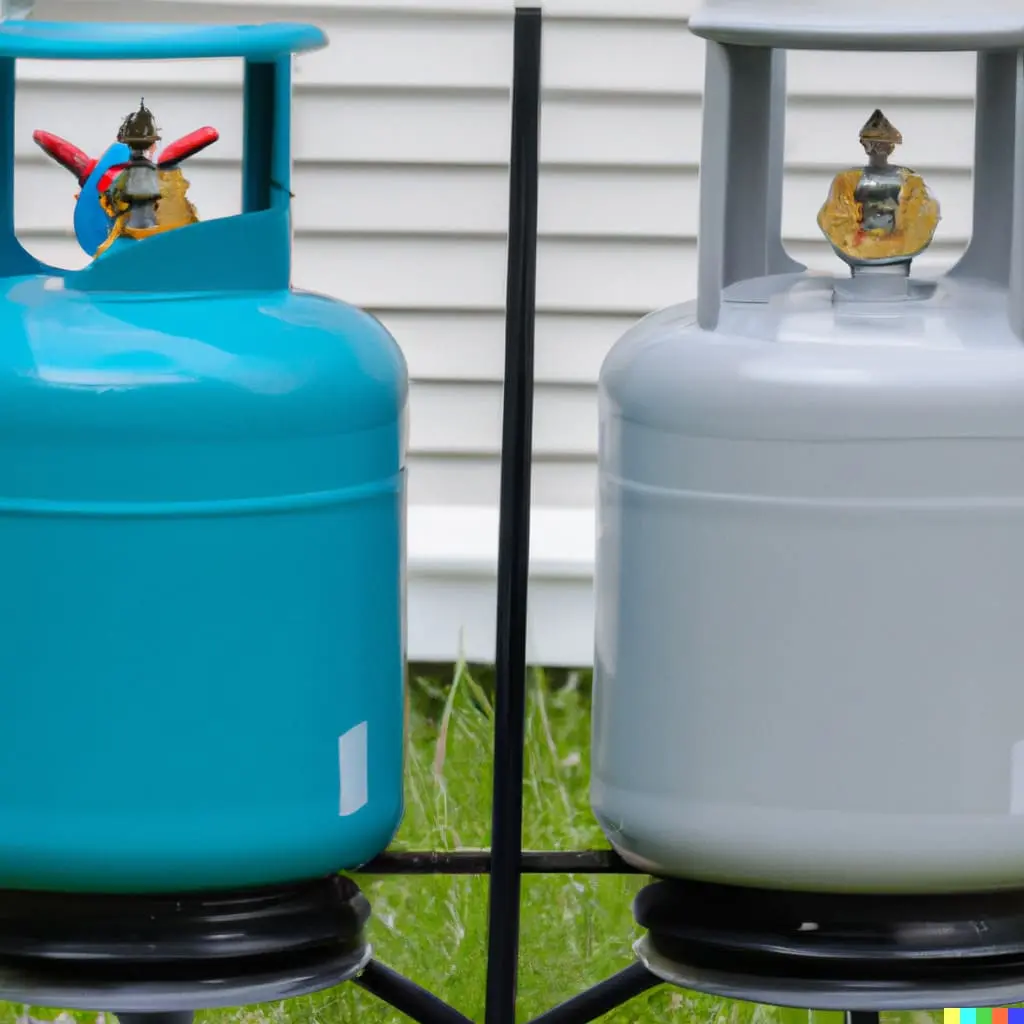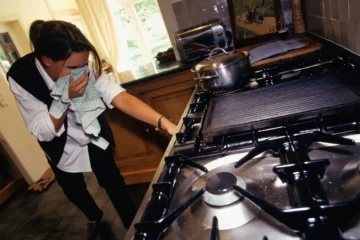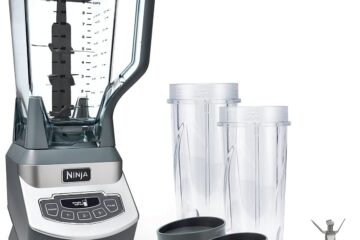Natural gas and propane are two popular fuels used for heating, cooking, and powering various appliances in homes and businesses. While both fuels offer several benefits, the question that often arises is whether they are interchangeable. While both fuels are considered clean sources of energy and offer cost-effective solutions, there are fundamental differences between natural gas and propane that must be considered before making a switch. This critical analysis aims to highlight the key differences between natural gas and propane and determine whether they are truly interchangeable.
The article will provide a comprehensive analysis of are natural gas and propane interchangeable, the advantages and disadvantages of each fuel and determine the best course of action for consumers and businesses looking to make a switch. Whether you are a homeowner, business owner, or just interested in energy efficiency, this article will provide valuable insights into the world of natural gas and propane.
What Is Propane And Natural Gas?
Propane and natural gas are used for heating, cooking, and generating electricity. They are both gases that are stored in tanks or pipelines and are distributed to homes and businesses.
Propane is a hydrocarbon gas stored as a liquid in pressurized tanks. It is commonly used as a fuel source for heating, cooking, and generating electricity. Propane is also used as a vehicle fuel and raw material in manufacturing chemicals.
On the other hand, natural gas is a mixture of gases, primarily methane, that is stored in underground reservoirs and transported to homes and businesses through pipelines. It is commonly used for heating, cooking, and generating electricity. Natural gas is also used as a fuel for vehicles and as a raw material in the chemical industry.
The Differences Between Natural Gas And Propane.
Propane and natural gas are both commonly used as fuel sources, but there are some key differences between the two:
Composition
Propane is a byproduct of petroleum and natural gas processing, while natural gas is primarily composed of methane.
Storage
Propane is stored as a liquid in pressurized tanks. In contrast, natural gas is stored underground reservoirs and transported through pipelines to homes and businesses.
Energy Content
Propane has a higher energy content per unit of volume than natural gas, which means that it is more efficient as a fuel source.
Cost
Natural gas is typically less expensive than propane due to its greater availability and lower production costs.
Usage
Propane is commonly used for heating, cooking, and generating electricity in homes and businesses, as well as for fueling vehicles and as a raw material in the chemical industry. Natural gas is also used for these purposes and to generate electricity in power plants.
Safety
Propane is highly flammable and explosive, which makes it a potential fire and explosion hazard. Natural gas is also flammable, but it is less explosive than propane.
Environmental Impact
Natural gas is considered a cleaner fuel source than propane, as it releases fewer emissions when burned. However, the production and transportation of natural gas can have significant environmental impacts, such as air and water pollution.
Are Natural Gas And Propane Interchangeable?
No, natural gas and propane are not interchangeable. Although they are both gases used as fuel sources, they have different chemical compositions and properties that make them unique.
Natural gas primarily consists of methane, while propane is a byproduct of natural gas processing or refining petroleum. Propane has a higher energy density than natural gas. It can be stored in tanks for later use, making it a popular fuel source for homes and businesses in rural areas or for use in recreational vehicles.
In addition, the appliances and equipment used for natural gas and propane are different and are not compatible with each other. This means that an appliance designed to use natural gas can only be converted to propane and vice versa by making significant changes to the appliance.
So while natural gas and propane are commonly used as fuel sources, they are not interchangeable and must be used with the appropriate equipment and appliances.
Is It Better To Have Natural Gas Or Propane?
Whether it is better to have natural gas or propane depends on various factors, including:
Availability
Natural gas is typically only available in certain regions with a natural gas pipeline network. Propane, on the other hand, can be delivered to homes and businesses by truck, making it more accessible in rural or remote areas.
Cost
The cost of natural gas and propane can vary greatly depending on location and availability. Natural gas is often less expensive than propane on a per-unit basis, but the cost of propane can be more stable.
Efficiency
Both natural gas and propane are highly efficient fuel sources. However, the efficiency of a particular appliance may vary depending on whether it is designed to use natural gas or propane.
Environmental impact
Natural gas is a fossil fuel that produces greenhouse gases when burned. Propane is also a fossil fuel, but it produces fewer greenhouse gases per unit of energy than natural gas.
Why Do People Use Propane Instead Of Natural Gas?
Propane and natural gas are both commonly used as fuels for heating and cooking. Still, people may choose propane over natural gas for several reasons.
Propane is a type of liquefied petroleum gas (LPG) stored in a tank and used as needed. In contrast, natural gas is typically supplied through pipelines. This means that propane can be used in areas without access to a natural gas pipeline, such as rural areas. Propane is also portable, so it can be used for outdoor cooking and heating, making it a popular choice for recreational vehicles and outdoor activities.
Also, propane burns hotter than natural gas so it may be more efficient for certain heating applications. However, propane can be more expensive than natural gas, especially if you have to have the tank refilled.
What Happens If You Use Propane Instead Of Natural Gas?
If you use propane instead of natural gas, it could cause damage to your appliance and affect its performance. Propane and natural gas are not interchangeable, and using one instead of the other could result in a gas leak or fire. Propane and natural gas have different characteristics, such as pressure, heating value, and composition. This means that appliances that use natural gas may not function properly with propane and vice versa.
In addition, appliances designed to use propane may not work optimally with natural gas, as the pressure and heating value of the two fuels is different. This can result in incomplete combustion, which can cause damage to the appliance, reduce its efficiency, and potentially create indoor air quality issues.
Therefore, always use the correct fuel for your appliance and consult a licensed professional if you need to convert your appliance from one fuel to the other.
Are Natural Gas And Propane Stoves The Same?
No, natural gas and propane stoves are not the same. While both types of stoves use gas as a fuel source, they are designed to work with different types of gas and have different combustion characteristics.
Natural gas stoves are designed to be connected directly to a natural gas line. They use natural gas as their fuel source. Propane stoves, on the other hand, typically use propane from a tank or cylinder and are not directly connected to a natural gas line.
Because of the differences in pressure and heating value between natural gas and propane, stoves designed for one fuel may need to be fixed with the other. For example, a stove designed for natural gas may need more heat when used with propane, and a stove designed for propane may produce too much heat when used with natural gas.
- Alcohol Stove Vs Propane (A Side By Side Comparison)
- What Temperature Is Simmer 1-10? (The Essential Guide)
Why Is Propane Better Than Natural Gas?
Propane and natural gas are both popular fuel sources for heating and cooking. Still, each has its advantages and disadvantages. Here are some of the key factors that make propane a better choice in certain situations:
Portability
Propane is stored in tanks and can be easily transported, making it a good choice for homes not connected to a natural gas pipeline.
Energy Density
Propane has a higher energy density than natural gas, meaning that it contains more energy per unit of volume. This makes it a more efficient fuel source for heating and cooking.
Performance in Cold Weather
Propane is less likely to freeze than natural gas and continues to work efficiently even in very cold weather. This makes it a good choice for areas with harsh winters.
Remote Location
Propane can be delivered to remote locations that may not have access to natural gas pipelines, making it a good choice for rural or remote homes.
Propane To Natural Gas Conversion Chart
Here is a conversion chart for propane (LP gas) to natural gas:
| Propane (LP Gas) BTU | Natural Gas BTU |
| 100,000 BTU/hr | 96,000 BTU/hr |
| 200,000 BTU/hr | 192,000 BTU/hr |
| 300,000 BTU/hr | 288,000 BTU/hr |
| 400,000 BTU/hr | 384,000 BTU/hr |
| 500,000 BTU/hr | 480,000 BTU/hr |
Please note that the conversion factor can vary based on the pressure and temperature at which the gases are used. These values should only be used as a general guide, not as a precise conversion. It’s recommended to consult with a licensed professional or the manufacturer of the appliance to determine the exact conversion factor for your specific application.
Natural Gas To Propane Conversion Calculator
To convert natural gas to propane, you can use the following calculator:
- Determine the BTU rating of your natural gas appliance.
- Multiply the BTU rating by 1.10 to get the equivalent propane BTU rating.
- Divide the propane BTU rating by the BTU rating of propane to determine the propane consumption rate in gallons per hour.
For example, if your natural gas appliance has a BTU rating of 50,000, the equivalent propane BTU rating would be 55,000 (50,000 x 1.10). If the propane has a BTU rating of 91,600, the propane consumption rate would be 0.6 gallons per hour (55,000 / 91,600).
Natural Gas Vs Propane Orifice
Natural gas and propane orifices are designed differently because they have different characteristics. Natural gas orifices have larger holes than propane orifices because natural gas has a lower heating value and pressure than propane. Propane orifices have smaller holes because propane has a higher heating value and pressure than natural gas. Therefore, using the correct orifice for your gas appliance is important to ensure safe and efficient operation.
How Is Propane Converted Into Natural Gas?
Propane is not converted into natural gas, as they are two different gases. Propane is a byproduct of natural gas processing and petroleum refining, while natural gas is primarily composed of methane and is extracted directly from underground gas deposits. However, propane can be liquefied and transported in tanks for use as a fuel source.
Changing Orifice From Natural Gas To Propane
To change an orifice from natural gas to propane, follow these steps:
- Turn off the gas supply to the appliance.
- Remove the burner assembly from the appliance.
- Locate the orifice on the burner assembly.
- Use a wrench or pliers to unscrew the orifice from the burner assembly.
- Install the new propane orifice into the burner assembly.
- Reinstall the burner assembly into the appliance.
- Turn on the gas supply and test the appliance to ensure it functions properly.
How To Convert Natural Gas Heater To Propane?
Converting a natural gas heater to propane requires several steps. It should be done by a licensed professional to ensure safety and compliance with local codes. The following are the general steps involved:
- Purchase a propane conversion kit compatible with your heater model.
- Turn off the gas supply to the heater and disconnect the natural gas line.
- Remove the natural gas orifices and replace them with the propane orifices included in the conversion kit.
- Adjust the air shutter to the new propane settings specified in the conversion kit.
- Replace the regulator with the propane regulator included in the conversion kit.
- Connect the propane line to the heater and test for leaks using a gas leak detector solution.
- Turn on the gas supply and test the heater’s operation and safety features.
Again, hiring a licensed professional to perform this conversion is important to ensure safety and compliance with local codes.
Will A Natural Gas Heater Run On Propane?
No, a natural gas heater cannot run on propane without being converted. Natural gas and propane have different chemical properties and require different fuel nozzles and pressure regulators, so the heater needs to be modified to ensure safe and efficient operation with propane. It is important to consult with a qualified professional to ensure that the conversion is done correctly.
Overall Thoughts
Thus, it is impossible for propane and natural gas to be interchangeable. They have different origins, different characteristics (e.g., one is flammable, the other isn’t), different endpoints, and are used for different purposes. Both are useful substances and can serve different functions, but they will never be interchangeable because of their fundamental differences. We hope you enjoyed our article today.
Frequently Asked Questions
Is It Cheaper To Heat With Propane Or Natural Gas?
In most areas, natural gas is cheaper than propane as it is widely available and produced domestically. On the other hand, propane is often more expensive as it must be transported and stored in tanks.
Are Natural Gas And Propane Grills The Same?
No, natural gas and propane grills are not the same. Natural gas grills use a natural gas line connected to the home, while propane grills use propane tanks as fuel. The type of grill you choose depends on your personal preference and the gas availability in your area.
How Much Is Propane Equivalent To Natural Gas?
One cubic foot of propane gas equals approximately 2,516 BTUs of energy. To compare, one cubic foot of natural gas equals approximately 1,030 BTUs of energy. Therefore, you would need roughly 2.44 cubic feet of natural gas to equal the energy of one cubic foot of propane gas.
Do Gas Stoves Use Propane Or Natural Gas?
Gas stoves can use propane and natural gas, but the type of gas depends on their configuration. Propane stoves require a propane tank, while natural gas stoves are connected to a gas line.
Are Propane And Natural Gas Hoses The Same?
No, propane and natural gas hoses are not the same. Propane hoses are designed to handle the higher pressure of propane gas, while natural gas hoses are designed to handle the lower pressure of natural gas. Additionally, propane hoses are typically made of a different material than natural gas hoses, as propane can be more corrosive.




